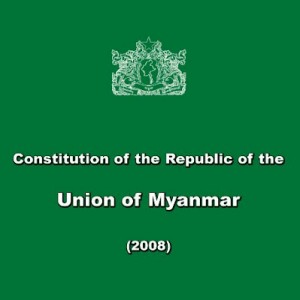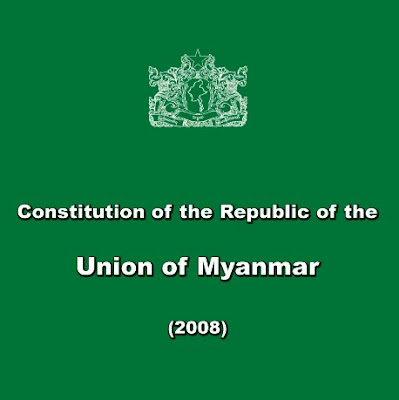
By Pon Nya Mon – The amendment of Burma’s Constitution recently has become a hot issue yet again. The lower house of Burma’s parliament has approved the formation of a committee that will review the 2008 Constitution to make necessary amendments. The opposition groups have pointed out that changes are needed in the Constitution in order to form a genuine federalist union to resolve long-standing ethnic and political conflicts in the country.
The government agrees changes need to happen but expressed a totally different perspective on what changes they should be. They, with aligned political parties, said any changes must be made in Parliament, by Parliament.
On the contrary, opposition groups like United Nationalities Federal Council (UNFC) and United Nationalities Alliance (UNA) rejected the 2008 Constitution, proposing that the country needs an entire new one. They say in its present form its undemocratic thus trying to amend within its rigid framework would be illogical.
Those in favor of the Constitution, like the Myanmar Peace Center, have criticized these notions claiming that rewriting it is both impractical and would lead to a confrontation. However, there hasn’t been real discussions on the Constitution’s flaws or how it could be amended when Parliament in itself is essentially undemocratic.
It is of my opinion, we must not fail to acknowledge that by forcing the opposition groups to accept an undemocratic constitution will also lead to a confrontation.
Opposition parties like the National League for Democracy (NLD) have admitted the problematic nature of amending the 2008 Constitution in a flawed parliament. Speaking at the World Economic Forum in Naypyidaw, NLD leader Daw Aung San Suu Kyi called the 2008 Constitution “the world’s most difficult Constitution to amend”.
According to the Constitution, 75-percent of votes in the national parliament, and 50-percent at a national referendum would be required to amend it. Passing a proposed amendment through the national referendum may not be so difficult, but for it to pass through Parliament, if it is not favored by the military would be next to impossible. Most of the seats are guaranteed to the military-backed Union Solidarity and Development Party (USDP) and non-elected military representatives. Together they hold 75-percent of the parliamentary seats. Essentially Parliament, in itself, is not democratic and any proposed amendments still must be given the green light by the military.
Therefore, it makes sense to first change the constitutional amending procedures before constitutional amendments are attempted. It should only be attempted when a fair and democratic process has been implemented. Several flaws within the 2008 Constitution could be improved once the clause of Constitution amending procedure is changed.
For example, the clause could be changed so that any constitutional amendment require only 51-percent of the votes and 75-percent during a national referendum instead of the current structure. This procedural change may not help opposition groups pass a constitutional amendment under the current parliamentary term, but it if they secure seats in 2015 elections, these changes will give them more power to amend the Constitution within Parliament. This would allow more opportunity to reshape the Constitution without having to scrap it.
Another alternative to re-writing a new constitution would be to amend the Constitution outside of Parliament in a democratic setting.
The Second Pin Long Conference that promises to bring representatives from the USDP ruling party and military together with democratic forces and ethnic nationalities has the potential to serve this purpose. A constitution amendment at such a national convention will be then followed by a national referendum. This approach would be more inclusive and democratic since all political forces can participate in the process.
Regardless of whether changes happen within, or outside of parliamentary proceedings it will only be successful if the government is willing. Already the government amended the election law that allowed the NLD to participate in 2012 by-election. Since the USDP and military together control over 75-percent of the parliamentary seats, no other political party could block this amendment.
If the government is sincere in their efforts to achieve peace and national reconciliation in Burma, it alone wields the power to change the Constitution without delay. Amending it without their support is next to impossible.
Rewriting a new constitution would be a better and more attainable solution to peace and prosperity in the country.
Note-Pon Nya Mon is a research fellow at the Salween Institute (www.salweeninstitute.org).
He can be reached at [email protected]. Editor

